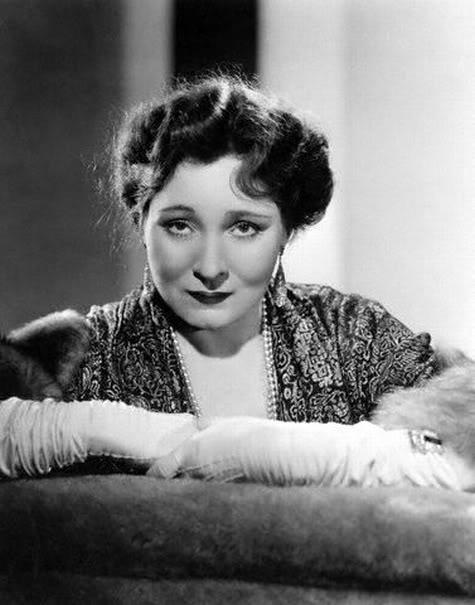Margaret Dumont (Daisy Juliette Baker)

Margaret Dumont was born Daisy Juliette Baker in Brooklyn, New York, the daughter of William and Harriet Anna (née Harvey) Baker. As a child, she lived in the South, where she was mainly raised by her godfather, writer Joel Chandler Harris. She grew to stand 5′ 9″ (1.75 m). Margaret Dumont trained as an operatic singer and actress in her teens, and began performing on stage in both the U.S. and in Europe, at first under the name Daisy Dumont and later as Margaret (or Marguerite) Dumont. Her theatrical debut was in Beauty and the Beast at the Chestnut Theater in Philadelphia, and in August 1902, two months before her 20th birthday, she appeared as a singer/comedienne in a vaudeville act in Atlantic City. The dark-haired soubrette, described by a theater reviewer as a “statuesque beauty”, attracted notice later that decade for her vocal and comedic talents in The Girl Behind the Counter (1908), The Belle of Brittany (1909), and The Summer Widower (1910). In 1910, she married millionaire sugar heir and industrialist John Moller Jr., and retired from stage work, although she had a small uncredited role as an aristocrat in a 1917 film adaptation of A Tale of Two Cities. The marriage was childless. After her husband’s sudden death during the 1918 influenza pandemic, she returned reluctantly to the Broadway stage, and soon gained a strong reputation in musical comedy productions. She never remarried. Her Broadway career included roles in the musical comedies and plays The Fan (1921), Go Easy, Mabel (1922), The Rise of Rosie O’Reilly (1923/24), and The Fourflusher (1925), and she had an uncredited role in the 1923 film Enemies of Women.
Margaret Dumont then came to the attention of writer George S. Kaufman, who hired her to play the dowager Mrs. Potter alongside the Four Marx Brothers in their Broadway production of The Cocoanuts in 1925. In October 1928, their next Broadway show, Animal Crackers, opened, and Dumont was again cast as Mrs. Rittenhouse, the wealthy society dowager and their straight woman. In 1929 they filmed the screen version of The Cocoanuts. Performing with the Marx Brothers, Dumont played wealthy high-society, posh-voiced widows whom Groucho alternately insulted and romanced for their money. The roles are Mrs. Potter in The Cocoanuts (1929), Mrs. Rittenhouse in Animal Crackers (1930), Mrs. Gloria Teasdale in Duck Soup (1933), Mrs. Claypool in A Night at the Opera (1935), Mrs. Emily Upjohn in A Day at the Races (1937), Mrs. Suzanna Dukesbury in At the Circus (1939), and as Martha Phelps in The Big Store (1941). Her work in A Day at the Races earned her a Best Supporting Actress Award from the Screen Actors Guild, film critic Cecilia Ager suggesting that a monument be erected in honor of her courage and steadfastness in the face of the Marx Brothers’ antics. Groucho once said that many people believed they were married in real life, even though they were not.
Decades later in his one-man show at New York’s Carnegie Hall, Groucho mentioned Margaret Dumont’s name and got a burst of applause. He falsely informed the audience that she rarely understood the humor of their scenes together and would ask him, “Why are they laughing, Julie?” (“Julie” was her nickname for Julius, Groucho’s birth name). Dumont was so important to the success of the Marx Brothers films, she is one of the few people mentioned by Groucho in his short acceptance speech for an honorary Oscar in 1974. (The other four are Harpo, Chico, his mother, and his companion Erin Fleming. Zeppo Marx and Gummo Marx alive at the time, were not mentioned.) In her interviews and press profiles, Dumont preserved the myth of her on-screen character: the wealthy, regal woman who never quite understood the joke. Margaret Dumont’s acting style, especially in early films, provides a window into the old-fashioned theatrical style of projecting to the back row, such as trilling the “r” for emphasis. She had a classical operatic singing voice which screenwriters eagerly used to their advantage.
Perpetuating Groucho’s joke on the subject, film critics and historians have incorrectly stated for decades that since Dumont never broke character or cracked a smile at Groucho’s jokes, she did not “get” the Marx Brothers’ type of humor. The fact is she knew the jokes were funny indeed, but, as a seasoned actress and a professional, kept a straight face no matter what. In the early Marx brothers films, especially when Groucho levels an insult at her, she can be seen giving an appropriate and fleeting “shocked” response as part of her characterization. In a 1940 interview with the World Wide Features press syndicate, Margaret Dumont said, “Scriptwriters build up to a laugh, but they don’t allow any pause for it. That’s where I come in. I ad lib—it doesn’t matter what I say—just to kill a few seconds so you can enjoy the gag. I have to sense when the big laughs will come and fill in, or the audience will drown out the next gag with its own laughter… There’s an art to playing straight. You must build up your man, but never top him, never steal the laughs from him.” After her death from a heart attack on March 6, 1965, Margaret Dumont was cremated, her ashes stored in the vault at the Chapel of the Pines Crematory in Los Angeles. She was 82 years of age, although many obituaries mistakenly gave her age as 75.
Born
- October, 20, 1882
- USA
- Brooklyn, New York
Died
- March, 06, 1965
- USA
- Hollywood, California
Cause of Death
- heart attack
Cemetery
- Chapel Of The Pines Crematory
- Los Angeles, California
- USA



